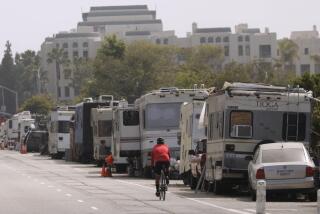Targeting street sales of cars
- Share via
Los Angeles may start cracking down on the impromptu, do-it-yourself used car lots that have sprung up along some streets, raising the ire of nearby residents who find them a more common sight in these tough economic times.
A City Council committee created a task force Wednesday to consider ways to restrict vehicle owners from selling their cars the cheap and easy way, by slapping “For Sale” signs in the windows and parking them on major thoroughfares and neighborhood streets.
Councilman Tom LaBonge proposed the action, saying some residential streets have turned into de facto car lots, creating traffic and parking problems as well as visual blight.
“If people want to buy a used car, they should ‘Go see Cal’ -- not go to Los Feliz Boulevard,” he said.
Los Angeles tried several years ago to ban the parking of cars with “For Sale” signs on city streets, but a federal judge tossed out the ordinance, ruling that it violated car owners’ 1st Amendment right to free speech.
The council’s Public Works Committee on Wednesday instructed city lawyers, with the assistance of the Los Angeles Police Department and the city’s transportation and street services agencies, to determine if there is a legal way to regulate those vehicles.
Council members said they’ve received complaints about for-sale cars from residents and business owners in Harbor City, Venice and South Los Angeles and throughout the San Fernando Valley.
LAPD Officer Craig Orange told the committee that Los Feliz, Eagle Rock and Hollywood have become hot spots for people selling their cars, creating bottlenecks and taking away valuable parking spaces from people living in nearby apartments and condominiums.
A number of people who were selling their cars Wednesday along 51st Street and Avalon Boulevard argued that the city would be eliminating one of the convenient and inexpensive ways for working people to sell and buy what amounts to a necessity in mass transit-poor Southern California.
“We’re in a recession!” said Freddie Martinez, who was trying to sell a light-silver 1995 Isuzu Rodeo. “The little [that] people have saved, they’ve used up already, and for some this is now their only option.”
Martinez, 50, said he’s selling the vehicle because he needs money to pay his rent and bills. A part-time truck driver, he said that his hours had been reduced and that he needs extra income.
However, Andres Diaz, a 44-year-old tow truck driver who lives nearby, said he’s all for a city crackdown on the cars, which hog a lot of the parking in the neighborhood.
“The problem is at night, when they park all the cars here because it’s more of a residential area and the owners probably think it’s safer to leave them here overnight,” Diaz said.
The council instructed the task force to consider adopting restrictions similar to those imposed in Lawndale in November. That city limits the time owners can park a for-sale vehicle on major city streets to four consecutive hours. There are no time limits for vehicles parked within 500 feet of the owner’s residence, however.
Peter Eliasberg of the American Civil Liberties Union of Southern California said the Lawndale ordinance raises serious constitutional issues because, instead of regulating parking for all vehicles, it specifically targets those with “For Sale” signs.
“It doesn’t get around 1st Amendment concerns one iota,” he said.
The ACLU helped represent Edward Burkow in his successful court challenge of Los Angeles’ ban on parking cars with “For Sale” signs on city streets in 2000. Burkow took the city to federal court after he received a $35 parking ticket in September 1999.
U.S. District Judge A. Howard Matz ruled in Burkow’s favor, striking down the ordinance as an unconstitutional violation of free speech.
The judge stated that, under the ordinance, “commercial advertisements on cars could offer anything for sale . . . except the car on which the sign is mounted.”
--
ruben.vives@latimes.com
More to Read
Sign up for Essential California
The most important California stories and recommendations in your inbox every morning.
You may occasionally receive promotional content from the Los Angeles Times.















